Good People,
Is Africa going to be a battle ground for World War 3??? This is typically senseless and irresponsible for those who engineered and conspired for their GREED MONSTER in the CORRUPTION that is eating away fabric of Africa's wealth and resource through African corrupt leadership.
Those International Corporate Special Business network doing business with Chinese must urgently go back to the drawing board for the sake of America and the rest of European Nations, to re-structure how to engage Africa's manpower for a restructured business engagement instead of financing and supporting the importation of Chinese Labor force that include Chinese prisoners that have broken the banks of Chinese prisons cells, to substitute them with African labor force, and overtake Africa that are readily available on the ground and because African wealth resource is valueable and are in high demand in the Global Emerging Market Place.
The worst part of bad planning in consideration is that, to engage the Chinese invasion to Africa is in essence taking Environmental Pollution of International Policy lightly. The serious damage the Chinese have already incurred in their Africa's invasion is irreversible. They have ship in large scale, Africa's sand/land to China to repair their polluted environment. In a few years, the wealth resource availability and value in Africa shall have been depleted. African will turn to desert. Who is the looser and who will have benefited??? Let us think creatively with our brains and stop thinking with our stomachs and the corrupt money put in our leadership pockets. That corrupt money does not help taxpayers and ordinary citizens. What is going on is unacceptable.
For the three African musketeers i.e. Museveni, Kagame and Uhuru, who believe in beating up their chest boastfully showing off their power and might, and in the illegal, corrupt and unconstitutional power of their mass assassination in the barrel a gun; must be told in no uncertain terms that "The Game is UP" that they must surrender. For Kagame to demand that UN report on Congo sanctions to be dismissed is asking a bit out of the ordinary, unless they are trying to imply that their corruption was aided by the UN and that the UN are part and parcel for destroying Africa through the Chinese conspiracy to become the world's superpower, which has as well failed and shall bear no fruit...........
If UN is controlled by the three African Musketeers in their chronic corruption in Africa i.e. Kagame, Museveni and Uhuru, then it becomes a serious concern ....... and that the above is true, that Paul Kagame of Rwanda can dismiss the true report from UN and call for its dismissal, then The UN Secretary Ban-ki-moon has some explaining to do with burning questions to answer why Africa is invaded and Africans are being exterminated by the Chinese interest and why the world should not take Ban-ki-moon to task over conspiracies of the same........???
It is because the Africa and the World has woken up and the same does not need cheap polluted, poisonous products and deliverables from China that are equally killing Global business in essense. Their products way of doing business is killing sustainable structured economic system of doing good business and are polluting the environment and destroying nature in the world and it is unacceptable..........
Yes!!! President Obama with other world leaders have a huge intervention to do to avoid spillover catastrophes that are about to spike 3rd world war..............
Miriga
Diaspora Spokesperson
Executive Director
Confederation Council Foundation for Africa Inc.,
USA
http://socioeconomicforum50.blogspot.com
Diaspora Spokesperson
Executive Director
Confederation Council Foundation for Africa Inc.,
USA
http://socioeconomicforum50.blogspot.com
Fresh fighting in C. Africa as presidential vote looms
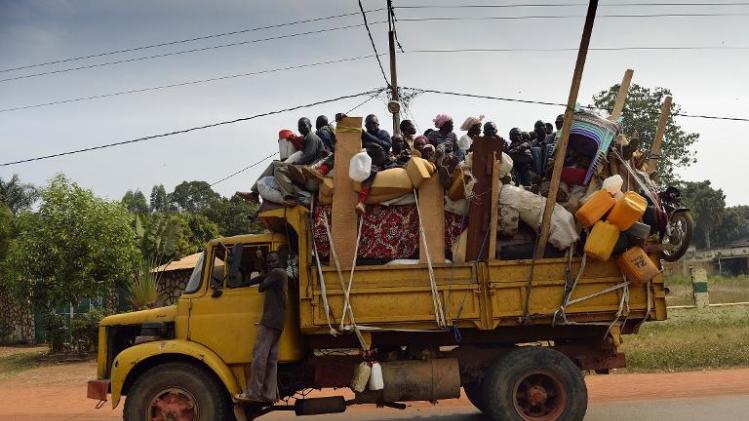
Bangui (Central African Republic) (AFP) - Fresh fighting broke out in the strife-torn Central African Republic as the deadline closed Saturday for candidates seeking to be chosen by parliament as the new interim president.
Sectarian violence has gripped the landlocked country after a March 2013 coup launched by the mostly Muslim Seleka rebels, and the UN has warned that the bloodshed could turn into genocide.
As clashes raged unabated Saturday, Save the Children said a grenade attack Friday on a truck convoy carrying Muslims fleeing to the north-west of the country had killed 23 people, including three children.
"It is a sign of the still fraught and highly dangerous situation in the Central African Republic that children and their families have been attacked and killed while trying to evacuate to safety," said Robert Lankenau from the charity.
The Seleka were disbanded after installing their leader as president in the mainly Christian country.
Some then turned rogue and carried out a string of atrocities including killings, rape and pillage, prompting Christians to form vigilante groups in response, and plunging the country into a vicious cycle of revenge attacks.
"There is some violence nearly everywhere," an officer with the MISCA African peacekeeping force told AFP, pointing to Bouar in the west near the border with Cameroon, the town of Sibut north of Bangui, and Boali to the northwest of the capital."People are in a desperate situation and as we get closer to the election it is going to get worse," added the officer, who requested anonymity.
At least three people were killed in Sibut, a resident told AFP by telephone as under-siege civilians called on the international forces for help.
"I'm putting out a cry of alarm," said the resident who asked not to be named. "The Seleka movement is reigning like warlords in the city and there is no foreign force to protect us."
A Catholic Church source said the parish premises came under attack in Sibut. "We tried to contact MISCA and (the French force) Sangaris for quick help, but so far there is no one," he said.
MISCA told AFP that teams were on their way to the town of about 25,000 people but a peacekeeper said that the force has been flooded with calls for help, all of which cannot be handled.
"Our hotline is jammed (with calls), we try to do what we can but we can't put a soldier in every house," he said.
Some 4,400 African troops and 1,600 French soldiers have been deployed to try to restore order in the impoverished country, but both missions have been calling for back up.
Ahead of an EU meeting on Monday expected to approve the deployment of 500 European soldiers to help secure Bangui's airport, German Foreign Minister Frank-Walter Steinmeier said Europe could not leave France alone in its bid to restore order in the country.
It is in Europe's interests to bring peace to the country, because "when instability, displacement and terrorism threaten Africa, the consequences will arrive in Europe," he told the Frankfurter Allgemeine Sonntagszeitung.
Michel Djotodia, who was installed by the Seleka as the first Muslim president in the country, resigned on January 11 under pressure from African leaders after he failed to stem the violence.
The country's transitional parliament is expected to vote on Monday for a new interim president. With the deadline for filing candidacies passed, the list of contenders is to be published on Sunday.
France's Defence Minister Jean-Yves Le Drian said Saturday that French forces would be "extremely vigilant" as the presidential vote takes place.
Muslims seek refuge in church
Despite the presence of peacekeepers, fighting has flared beyond Bangui with attacks on churches reported in the western town of Bossemptele near the border with Cameroon, according to the religious official in Bangui.
"The parish was sacked, the priest's car was stolen and the hospital was looted," he said. "There were some injuries."
In Boali, about 90 kilometres (55 miles) northwest of Bangui, a local priest Boris Wiligale said by phone that hundreds of Muslim nomads had taken refuge in his church.
"There are at least a dozen injured, including a seven-month-old baby whose face was slashed by a machete," he said.
The priest said French forces had disarmed the Seleka rebels in the town but that Christian militias have seized the opportunity to come out of the bush.
He said the militias killed three Muslims including a woman, and in turn one Christian was killed by the ex-Seleka rebels.
And in Bangui the UN children's agency UNICEF said Saturday that 23 children aged 14 to 17, including six girls, who had been recruited by armed groups have been handed over to child protection services.
- Religion & Beliefs
- Politics & Government
- Central African Republic
- Bangui
==========================
Rwanda asks for UN report on Congo sanctions to be dismissed
By Michelle Nichols
UNITED NATIONS (Reuters) - Rwanda asked a U.N. Security Council sanctions committee on Friday to dismiss a report that says the defeated M23 rebels in Democratic Republic of Congo are still recruiting fighters in Rwanda and Congolese troops are involved in rights abuses.
The confidential report by independent experts, seen by Reuters last month, also said it had "credible information that sanctioned M23 leaders are moving freely in Uganda and that M23 continued to recruit in Rwanda."
The experts monitor U.N. sanctions on Congo and report on violations to a U.N. Security Council sanctions committee, which is made up of all 15 council members. The committee was meeting on Friday afternoon to discuss the experts' report.
"Considering the many flaws indicated in this document, the U.N. Sanctions Committee should consider dismissing the Group of Experts' final report," Rwanda said in a seven-page document submitted to the committee, which was obtained by Reuters.
Rwanda, which just started its second year of a two-year term on the Security Council, said the allegations against it in the report "have no relevance in the current circumstances," and could undermine regional efforts to bring peace to the volatile, resource-rich eastern Congo.
"The Sanctions Committee should thus consider removing these allegations against Rwanda in the final report," it said.
The U.N. experts have repeatedly accused neighboring Rwanda of backing the 20-month rebellion by M23 in eastern Congo, a claim the Rwandan government has fiercely rejected. The U.N. Security Council has blacklisted M23.
Congolese troops and the U.N. peacekeeping mission - which includes a unique Intervention Brigade mandated to eliminate armed groups - defeated M23 in November and the group signed a peace deal with the Congo government last month.
But Martin Kobler, the top U.N. official in the Democratic Republic of Congo, warned on Monday that there were "credible reports of emerging M23 activities in Ituri in northeastern Congo."
M23 is one of dozens of rebel groups in eastern Congo. Millions of people have died from violence, disease and hunger in the region since the 1990s as armed groups have fought for control of the area's vast deposits of gold, diamonds, copper, cobalt and uranium.
'BLAME RWANDA'
In the document given to the committee, Rwanda said: "A clear pattern has been established whereby the Group of Experts seeks to entrench a 'blame Rwanda' narrative by endorsing any account that incriminates the government of Rwanda and dismissing those that exculpate or vindicate it."
"It should be made clear that the use of a U.N.-sanctioned mechanism to launch deliberate attacks against a U.N. member state through grave but unsubstantiated and damaging accusations without any credible evidence to back them are unacceptable," it said.
Uganda also wrote to the Security Council committee to deny accusations in the report that sanctioned M23 leaders were moving freely within Uganda and that most of the gold produced in Congo was traded in Uganda.
"It is difficult to understand why the group (of experts) came up with falsehoods and misconceived conclusions against Uganda in this way," Uganda's minister of state for international affairs, Okello Henry Oryem, wrote in a letter to the committee, also obtained by Reuters.
"The report in our view is obstructive in the ongoing efforts ... in bringing peace and stability to Democratic Republic of Congo," Oryem wrote.
Rwanda and Uganda both argued that they had cooperated with the U.N. experts and that information they had provided to the group had been ignored.
Several council diplomats said neither of Rwanda's requests to the committee were likely be successful. The committee works on the basis of consensus, which means it would only take an objection from one country to block Rwanda's requests.
Rwanda could go on to demand that the council place a hold on the report, which could relegate it to a kind of limbo and indefinitely prevent its official publication.
Theoretically, the Security Council could vote to publish it, but that would be unlikely if Kigali found support from council members like Russia and China, which have in the past delayed or prevented publication of U.N. experts' reports on other issues and repeatedly criticized U.N. experts' broad mandates.
In August, Rwanda blocked a joint U.S.-French proposal for the U.N. Sanctions Committee to impose U.N. sanctions on two senior commanders in the M23 rebel group in eastern Congo, arguing that the evidence against the men was weak.
Rwanda has repeatedly intervened in Congo, saying it had to hunt down the Hutu militia which fled after the 1994 Rwandan genocide. Rwanda and Congo have fought two wars over the past two decades in eastern Congo.
- Politics & Government
- Democratic Republic of Congo
- Rwanda
Get that act together Africa. By now, you should be tired of mindless people with guns being manipulated by people with power to this end. Start using logic and reason and challenge the logic of this kind of behavior and present it to the masses as beneath you.
==========================
China, Japan slug it out in the world's press
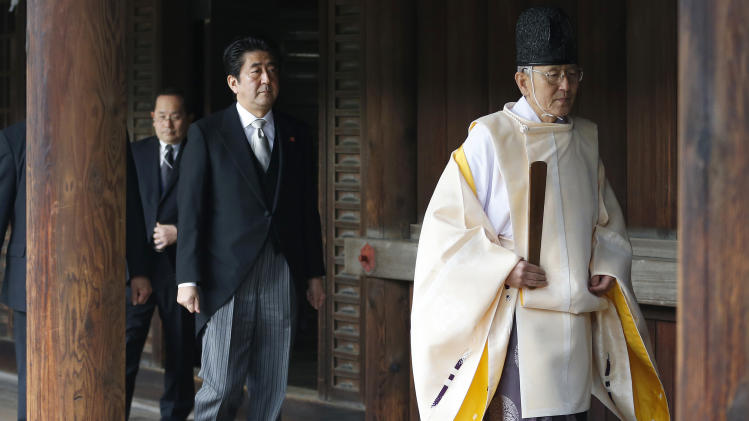
FILE - In this Dec. 26, 2013, file photo, Japanese Prime Minister Shinzo Abe, second from right, follows a Shinto priest to pay respect for the war dead at Yasukuni Shrine in Tokyo. Abe visited Yasukuni war shrine in a move sure to infuriate China and South Korea. The visit to the shrine, which honors 2.5 million war dead including convicted class A war criminals, appears to be a departure from Abe’s “pragmatic” approach to foreign policy, in which he tried to avoid alienating neighboring countries. China and Japan are engaged in a war of words on editorial pages around the world. Beijing has taken aim at a recent visit by Japan’s leader to a divisive war shrine, and Tokyo has answered back. (AP Photo/Shizuo Kambayashi, File)
WASHINGTON (AP) — China and Japan are engaged in a war of words that is lighting up editorial pages around the world as Beijing takes aim at a recent visit by Japan's leader to a controversial war shrine and Tokyo answers back.
Japan's ambassador to the U.S. fired the latest salvo Friday, accusing China of a global propaganda campaign that portrays Prime Minister Shinzo Abe as glorifying Japan's militaristic past. "It is not Japan that most of Asia and the international community worry about; it is China," Ambassador Kenichiro Sasae wrote in The Washington Post.
The dueling opinion pieces, appearing in a growing number of newspapers around the world, come as both nations have been criticized for recent actions: China's declaration of an air defense zone over a disputed area of the East China Sea and the Japanese prime minister's visit to Yasukuni, where convicted World War II war criminals are among the many enshrined.
Chinese diplomats have been especially blunt. Ambassadors have accused Abe of "a gross trampling upon world peace and human conscience" on the Pacific island of Vanuatu, having "put the international community on high alert" in Australia and doing something akin to "laying a wreath at Hitler's bunker" in Madagascar.
The most headlining-grabbing exchange to date was in Britain's Daily Telegraph, where the ambassadors of China and Japan compared each other's nations, in some shape or form, to the evil Lord Voldemort of the Harry Potter books.
Beyond trying to win over world opinion, the pieces are also an attempt to placate nationalist opinion at home.
The antipathy between Japan and China is rooted in Japan's occupation of parts of China, often brutally, in the first half of the 20th century. But ties have been especially strained since Tokyo in 2012 nationalized some unoccupied islands it administers in the East China Sea that are also claimed by Beijing. That touched off nationalist sentiments in China, which viewed the step as a change in the status quo and stepped up military patrols. For its part, Japan refuses to acknowledge that's there's a territorial dispute.
The two nations' security forces have steered clear of outright confrontation around the islands, known as Senkaku by Japan and Diayou by China, so war appears a distant possibility. It would be ruinous to both their economies, which are deeply interconnected.
But the propaganda battle is a serious one.
According to Japanese officials, China has posted articles in nearly 40 countries, and Japan has so far responded in a dozen of them, with more planned.
China began the op-ed offensive days after Abe's Dec. 26 visit to the Yasukuni shrine, the first by a Japanese prime minister since 2006. The visit angered China and the two Koreas, where occupying Japanese forces committed atrocities before and during World War II. The visit also drew a rare expression of disapproval by the U.S. of its Japanese ally.
China's tough response underscored how sensitive its people are about Japan's past abuses and current Japanese attitudes. But Jim Schoff, a senior associate for the Asia program at the Carnegie Endowment for International Peace in Washington, said China was also capitalizing on an opportunity provided by Abe's visit to put Japan on the defensive.
China faced a torrent of international criticism when it declared in November an air defense identification zone over the disputed area of the East China Sea, including the islands administered by Japan. China's action deepened concern over its highhanded approach to pushing its territorial claims with its neighbors and was sharply criticized by Washington.
Last week, China's ambassador to the U.S., Cui Tiankai, took to the pages of The Washington Post to argue his case in an influential publication in a capital that has a high stake in the standoff between the Asian rivals. America's treaty alliance with Japan means it could be drawn into a conflict.
Cui accused Abe of denying wartime atrocities and linked his homage at Yasukuni to his government's efforts to loosen the constitutional constraints to reform Japan's military and project power overseas.
Sasae upped the ante Friday. He criticized "China's unparalleled military buildup," noting its growth in military spending far exceeds Japan's. He also said China's control on information and debate at home means "Chinese people cannot see the truth that people throughout the world see."
That's likely to go down badly in Beijing.
But while the prospects for improving relations in the short term appear dim, Schoff said: "Better to escalate on the pages of newspapers than in other ways."
Mong Xã Hội Tốt Hơn
I am an American with Asian non-Japanese extraction and fully aware of Japanese atrocities during WW II. All cultures including the U.S. respect their war dead dearly. China is doing the same and also honors the death of the greatest mass murderer in the human history (Google "the worst genocides in the 20th and 21st centuries" for unbiased information) and Dang Xiaoping that used tanks to crush to death thousands of democracy-loving students. The Chinese communists want to deflect its people's attention from other critical issues such as the obscene wealth gap between the ruling communists and the common people, the deep-rooted corruption in the communist-led government, the terrible pollution, the total lack of political freedom. What Japan needs to do to remove the graves of the dozen war criminals (out of 2.5 million graves) to a different site to deny the Chinese communists a punching bag.
Timur
Japanese emperor has yearly memorial ceremony on the different site for the Japanese war dead. Nobody complained. The Japanese government refused to move the criminals out from the shrine on religious grounds that once a spirit is in, it cannot not be moved in the shrine--all wars are honorable and all war dead are worshipped in their eyes. There is no such a thing as wrong war or war criminals. That shrine is a war shrine. When the Japanese soldiers begin an expedition war overseas, they receive the blessings of all the spirits at the shrine.
J.P
Americans will never understand your Asian mojos/conflicts. Better yet, keep it over there.
Vincent
@Mong
What has China's internal affairs got to do with rising Japanese militarism, Japanese grabbing of Chinese territory?
Justice has eluded China since the end of 1945. Please research on the Cairo Declaration of 1943 and the Potsdam Conference of 1945 on the terms of Japanese surrender and you will understand that Japan is the land grabber....NOT China. Japan is supposed to return all lands forcibly acquired by the terms of the Potsdam Conference. They did not return the Senkakus / Diaoyus which they forcibly acquired in 1895. US looked the other way because in 1949, Communists took over China. Two wrongs don't make a right.
What has China's internal affairs got to do with rising Japanese militarism, Japanese grabbing of Chinese territory?
Justice has eluded China since the end of 1945. Please research on the Cairo Declaration of 1943 and the Potsdam Conference of 1945 on the terms of Japanese surrender and you will understand that Japan is the land grabber....NOT China. Japan is supposed to return all lands forcibly acquired by the terms of the Potsdam Conference. They did not return the Senkakus / Diaoyus which they forcibly acquired in 1895. US looked the other way because in 1949, Communists took over China. Two wrongs don't make a right.
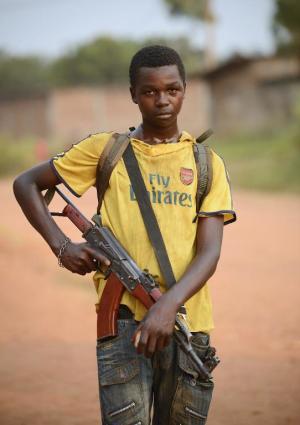
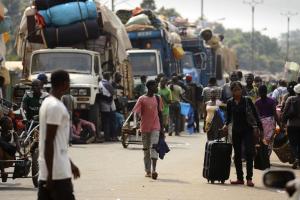
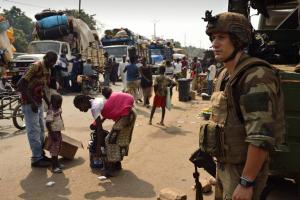


No comments:
Post a Comment